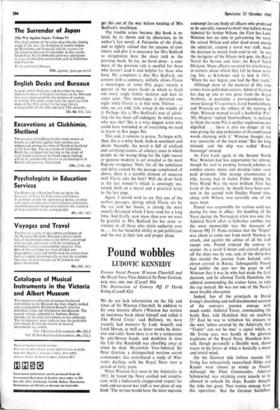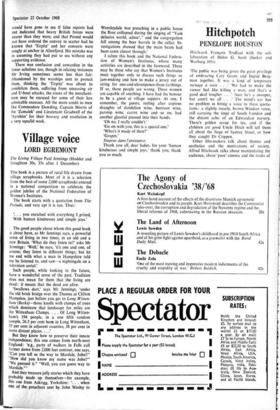Pound wobbles
LUDOVIC- KENNEDY
KCB, DSO, OBE, DSC (Cassell 50s)
The Destruction of Convoy PQ 17 David Irving (Cassell 42s) We do not lack information on the life and times of Sir_ Winston Churchill. In addition to his own massive efforts (1Vinstod has written an enormous book about himself and called it The World Crisis,' said Balfour), we have recently had memoirs by Lady Asquith and Lord Moran, as well as lesser works by detec- tive and valet. Soon there is to be a symposium by anti-Moran hands, and doubtless in time the Life that Randolph was chiselling away at when he died. Meanwhile Vice-Admiral Sir Peter Gretton, a distinguished wartime escort commander, has contributed a study of Win- ston's dealings with the Royal Navy over a period of forty years.
When Winston first went to the Admiralty in 1911, he found the Navy ossified and compla- cent, with a ludicrously exaggerated respect for rank and no naval war staff or war plans of any kind, 'The service would have the most supreme
contempt for any body of officers who professed to be specially trained to think'(my italics), wrote Admiral Sir Arthur Wilson, the First Sea Lord. Winston lost no time in galvanising the navy. He retired Wilson and other dead wood among the admirals, created a naval war staff, made the decision to switch from coal to oil: he was the instigator of the fifteen inch gun, the Royal Naval Air Service and, later, the Royal Naval Divikion. Many officers resented his interference in matters about which they felt he knew noth- ing, but, as Kitchener said to him in 1915: `When the war began, you had the fleet ready.'
Although most of the material of this time comes from published sources, Admiral Gretton has dug up one or two gems from the Royal Archives, in particular a correspondence be- tween George V's secretary, Lord Stamfordham, and Winston on the subject of the naming of ships. Winston wanted to call a battleship 'Pitt.' `His Majesty' replied Stamfordham, 'is inclined to think the name Pitt is neither euphonious nor dignified . . . there is also the danger of the men giving the ship nicknames of ill-conditioned words rhyming with it.' Winston thought this was 'unworthy of the royal. mind.' But the king insisted; and the ship was called Royal Sovereign' instead.
As First Lord again in the Second World War, Winston had less opportunity for reform, though his zeal in pushing forward schemes to combat enemy mines and develop 'radar soon paid dividends. One strange circumstance is why, having had in Jackie Fisher during the First World War the most brilliant First Sea Lord of the century, he should have been con- tent in the second with Dudley Pound who, along with Wilson, was certainly one of the most inept.
Pound was responsible for various cock-ups during his time in office : his handling of the Navy during the Norwegian crisis was one, the Admiral North affair at Gibraltar another, but the most memorable was the massacre of Convoy PQ 17. Panic-stricken that the `Tirpitz' was about to come out from north Norway to attack, and against the advice of all his staff except one, Pound ordered the convoy to scatter. As a result U-boats and aircraft picked off the ships one by one, and, of the thirty-five that started the journey from Iceland, only eleven arrived in Russia. Subsequently Pound had neither the guts nor the grace to tell Winston that it was he who had made the fatal decision, and he allowed Turtle Hamilton, the admiral commanding the cruiser force, to take the rap instead. He was not one of the Navy's most lovable characters.
Indeed, few of the principals in David Irving's absorbing and well-documented account of the convoy's journey emerge with much credit. Admiral Tovey, commanding the battle fleet, told Hamilton that on reaching 25° East he was to withdraw his cruisers to the west 'unless assured by the Admiralty that "Tirpitz" can not be met,' a signal which, as Mr Irving says, was hardly in the glorious traditions of the Royal Navy. Hamilton him- self, though personally a likeable man, shows traces in his letters of what is basically a mean
and trivial mind. • On the German side (whose records Mr Irving has exhaustively researched) Hitler and Raeder were almost as windy as Pound. Although the Fleet Commander, Admiral Schniewind, was straining every, muscle to be allowed to unleash his ships, Raeder thought the risks too great. Two ironies emerge from this operation: that the German battlefleet would have gone to sea if false reports had Pot indicated that heavy British forces were nearer than they were; and that Pound would not have ordered the convoy to scatter had he known that `Tirpitz' and her consorts were snugly at anchor in Altenfjord. His mistake was in assuming they had put to sea without any supporting evidence.
There was confusion and cowardice in the lower echelons too, though in relating instances Mr Irving sometimes seems less than fair. Abandoned by the warships sent to protect them, thinking the `Tirpitz' was about to annihilate them, suffering from unceasing air and U-boat attacks, the crews of the merchant- men may be excused for some of their less admirable excesses. All the more credit to men like Commodore Dowding, Captain Morris of the `Zamalek' and Lieutenant Gradwell of the 'Ayrshire' for their bravery and resolution in a very squalid week.















































 Previous page
Previous page